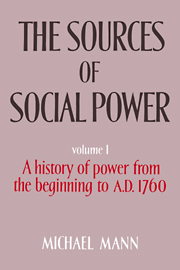Book contents
- Frontmatter
- Contents
- Preface
- 1 Societies as organized power networks
- 2 The end of general social evolution: how prehistoric peoples evaded power
- 3 The emergence of stratification, states, and multi-power-actor civilization in Mesopotamia
- 4 A comparative analysis of the emergence of stratification, states, and multi-power-actor civilizations
- 5 The first empires of domination: the dialectics of compulsory cooperation
- 6 “Indo-Europeans” and iron: expanding, diversified power networks
- 7 Phoenicians and Greeks: decentralized multi-power-actor civilizations
- 8 Revitalized empires of domination: Assyria and Persia
- 9 The Roman territorial empire
- 10 Ideology transcendent: the Christian ecumene
- 11 A comparative excursus into the world religions: Confucianism, Islam, and (especially) Hindu caste
- 12 The European dynamic: I. The intensive phase, A.D. 800–1155
- 13 The European dynamic: II. The rise of coordinating states, 1155–1477
- 14 The European dynamic: III. International capitalism and organic national states, 1477–1760
- 15 European conclusions: explaining European dynamism – capitalism, Christendom, and states
- 16 Patterns of world-historical development in agrarian societies
- Index
11 - A comparative excursus into the world religions: Confucianism, Islam, and (especially) Hindu caste
Published online by Cambridge University Press: 26 December 2009
- Frontmatter
- Contents
- Preface
- 1 Societies as organized power networks
- 2 The end of general social evolution: how prehistoric peoples evaded power
- 3 The emergence of stratification, states, and multi-power-actor civilization in Mesopotamia
- 4 A comparative analysis of the emergence of stratification, states, and multi-power-actor civilizations
- 5 The first empires of domination: the dialectics of compulsory cooperation
- 6 “Indo-Europeans” and iron: expanding, diversified power networks
- 7 Phoenicians and Greeks: decentralized multi-power-actor civilizations
- 8 Revitalized empires of domination: Assyria and Persia
- 9 The Roman territorial empire
- 10 Ideology transcendent: the Christian ecumene
- 11 A comparative excursus into the world religions: Confucianism, Islam, and (especially) Hindu caste
- 12 The European dynamic: I. The intensive phase, A.D. 800–1155
- 13 The European dynamic: II. The rise of coordinating states, 1155–1477
- 14 The European dynamic: III. International capitalism and organic national states, 1477–1760
- 15 European conclusions: explaining European dynamism – capitalism, Christendom, and states
- 16 Patterns of world-historical development in agrarian societies
- Index
Summary
No laws are possible in sociology. We may begin to search for general formulas of the form “if x, then y,” where y is the rise of ideological power; but we realize fairly quickly that ideological power on the scale of early Christianity is rare. Indeed, so far, in well-recorded history it has been confined to one particular historical epoch, between about 600 b.c. and a.d. 700 (and principally only in the latter two-thirds of that period). Furthermore, each of the four world religions or philosophies that rose to power in that period was unique in various ways. On that empirical basis we cannot build socialscience laws, for the number of cases is far smaller than the number of variables affecting the outcome. A tentative description of the rise of the religions and philosophies is all we can aim for.
Yet we should not avoid the comparative and theoretical issues raised by the rise of the world religions. This is not only because of their intrinsic importance. For they seem to have accompanied, indeed to have reorganized – in the role of “tracklayers” I described in Chapter 1 – a major turning point in world history. Until this period was complete, the histories of the various major civilizations of Eurasia, different as they were, had belonged to the same family of societies and social developments. For example, though I have not discussed developments in China and India, they would have been recognizably similar to those described so far in the Middle East and the Mediterranean.
- Type
- Chapter
- Information
- The Sources of Social Power , pp. 341 - 372Publisher: Cambridge University PressPrint publication year: 1986



